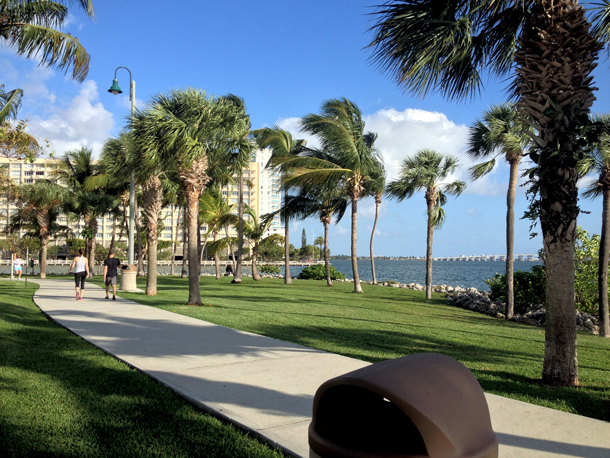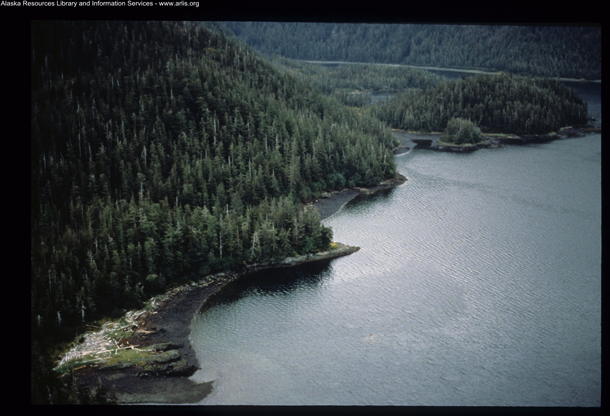Beyond the Headlines
Air Date: Week of March 8, 2019

The Margaret Pace Park is one of Miami’s public lands which will no longer be treated with glyphosate herbicides. (Photo: Ryan Healy, Flickr, CC BY-NC-ND 2.0)
In this week's trip beyond the headlines, Peter Dykstra and host Steve Curwood discuss the City of Miami's decision to ban the use of glyphosate by municipal employees. Then, the two take a look at the lengthy legal saga of Donald Trump's fight against a wind farm in the view shed of his Scottish golf resort in Aberdeenshire. Finally, they recount two massive oil spills -- Exxon-Valdez in 1989, and the Taylor spill, which has been going on since 2004.
Transcript
CURWOOD: So now it's time to take a look beyond the headlines with Peter Dykstra. Peter is an intrepid editor with Environmental Health News, that’s EHN.org and DailyClimate.org. He's on the line now from Atlanta, Georgia. Hi there. Peter. What do you have for us today?
DYKSTRA: Hi, Steve. Let's start with an item from Miami. Last week, the city of Miami banned the use, by its city government, of herbicides containing glyphosate. That's the main ingredient in Roundup, the leading weed-killing product for homes and gardens in the US and around the world. Miami Beach and the city of Stuart, about 100 miles north of Miami, had already banned it.
CURWOOD: And why does Miami say that glyphosate’s not something they want their city employees to use anymore?
DYKSTRA: Well, glyphosate is considered to be so effective at killing vegetation on land; they're concerned that it would also kill vegetation in Biscayne Bay.
CURWOOD: And what about human health effects?
DYKSTRA: Well, the World Health Organization of the UN has said that glyphosate is a probable carcinogen. Last year in California, a groundskeeper won a $78 million judgment. He convinced the jury that his lymphoma had been caused by his constant exposure to glyphosate on the job.
CURWOOD: And there could be a lot of people exposed. I mean, it's used in lawns, and golf courses, and almost everywhere. What do you have next for us?
DYKSTRA: Well, we're going to talk a little bit more about golf courses, because one of my favorite running stories has come to an end after about 11 or 12 years, or at least we think it's over. Donald Trump's Scottish golf resort in Aberdeenshire has been ordered to pay legal costs for both sides. The Trump Organization had sued a wind farm developer who put 11 wind turbines offshore. Trump said it ruined the view. Not only is it over, but he's going to have to pay extra for bringing lawsuits.
CURWOOD: I think the President Trump has a number of legal bills these days doesn't he?
DYKSTRA: Yep.
CURWOOD: Hey, what else do you have for us today?
DYKSTRA: In 2004, Hurricane Ivan tore up the Gulf of Mexico floor and unleashed America's longest lasting oil spill about 12 miles off the coast of Louisiana. Taylor Energy operates some wellheads there. They're suing the federal government contractor that's charged with trying to cap these wells. It's kind of a relatively slow leak, 700 barrels a day is the estimate. That 700 barrels a day has been over 15 years. And if you add it all up, the amount of oil spilled could approach the size of the Deepwater Horizon spill back in 2010.
CURWOOD: And why is the company suing?
DYKSTRA: They claim in litigation that the government's plan to cap the wells could actually make the spill worse. In the meantime, nobody's been able to deal with the oil spill for 15 years.
CURWOOD: Time now to take a look back at the history vault. Peter, what do you see today?

The Exxon-Valdez oil spill happened 30 years ago in Prince William Sound, Alaska. 10.8 million gallons of crude oil were spilled after the Exxon-Valdez oil tanker ran aground. (Photo: Arlis Reference, Flickr, CC BY-SA 2.0)
DYKSTRA: More oil spills. 30 years ago, later this month, the anniversary of the Exxon Valdez spill, the biggest in US history until Deepwater Horizon in 2010. They're still finding oil today. And fisheries like the herring fishery have never fully recovered.
CURWOOD: And what about the people? I think there's some spill victims who… Well, the court awarded them a lot of money, but I'm not sure they ever saw it?
DYKSTRA: This spill has literally cost billions to Exxon Mobil either to clean up the mess as best they could, or in paying thousands of victims in Alaska. Some of the settlements were in the millions, but it took 20 years to get it through the courts. So about one-fifth of the people who received settlements died before they got their check.
CURWOOD: And what happened to the captain, by the way, of the Exxon Valdez?
DYKSTRA: Oh, Captain Joe Hazelwood had gone away to his cabin. He was drunk, let a third mate, an unlicensed third mate, bring the boat through Prince William Sound. Captain Hazelwood was convicted of one count of negligence, and guess what he ended up doing? Teaching a marine safety course at a college in Long Island.
CURWOOD: Indeed Thanks, Peter. Peter Dykstra is with Environmental Health News, that’s EHN.org and DailyClimate.org. We'll talk to you again real soon.
DYKSTRA: Well, thank you, Steve. We’ll talk to you soon.
CURWOOD: And there's more on these stories on our website, LOE.org.
Links
Miami New Times | “Miami Bans Controversial Herbicides That Are Killing Biscayne Bay”
BBC | “Scottish Government Wins Donald Trump Wind Power Legal Costs”
Living on Earth wants to hear from you!
Living on Earth
62 Calef Highway, Suite 212
Lee, NH 03861
Telephone: 617-287-4121
E-mail: comments@loe.org
Newsletter [Click here]
Donate to Living on Earth!
Living on Earth is an independent media program and relies entirely on contributions from listeners and institutions supporting public service. Please donate now to preserve an independent environmental voice.
NewsletterLiving on Earth offers a weekly delivery of the show's rundown to your mailbox. Sign up for our newsletter today!
 Sailors For The Sea: Be the change you want to sea.
Sailors For The Sea: Be the change you want to sea.
 The Grantham Foundation for the Protection of the Environment: Committed to protecting and improving the health of the global environment.
The Grantham Foundation for the Protection of the Environment: Committed to protecting and improving the health of the global environment.
 Contribute to Living on Earth and receive, as our gift to you, an archival print of one of Mark Seth Lender's extraordinary wildlife photographs. Follow the link to see Mark's current collection of photographs.
Contribute to Living on Earth and receive, as our gift to you, an archival print of one of Mark Seth Lender's extraordinary wildlife photographs. Follow the link to see Mark's current collection of photographs.
 Buy a signed copy of Mark Seth Lender's book Smeagull the Seagull & support Living on Earth
Buy a signed copy of Mark Seth Lender's book Smeagull the Seagull & support Living on Earth

